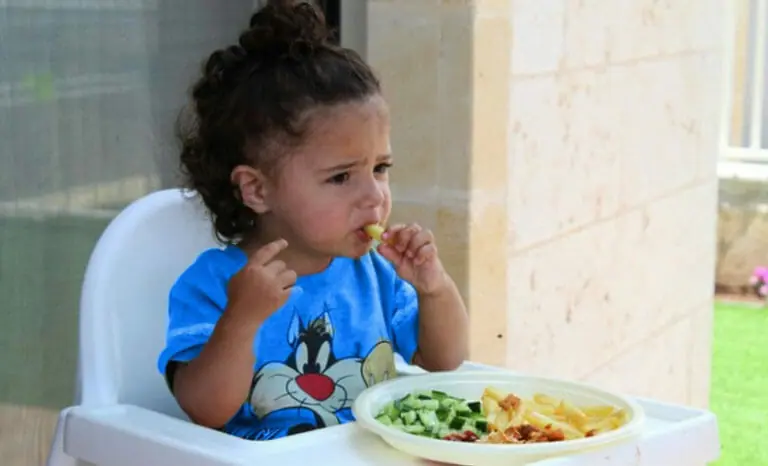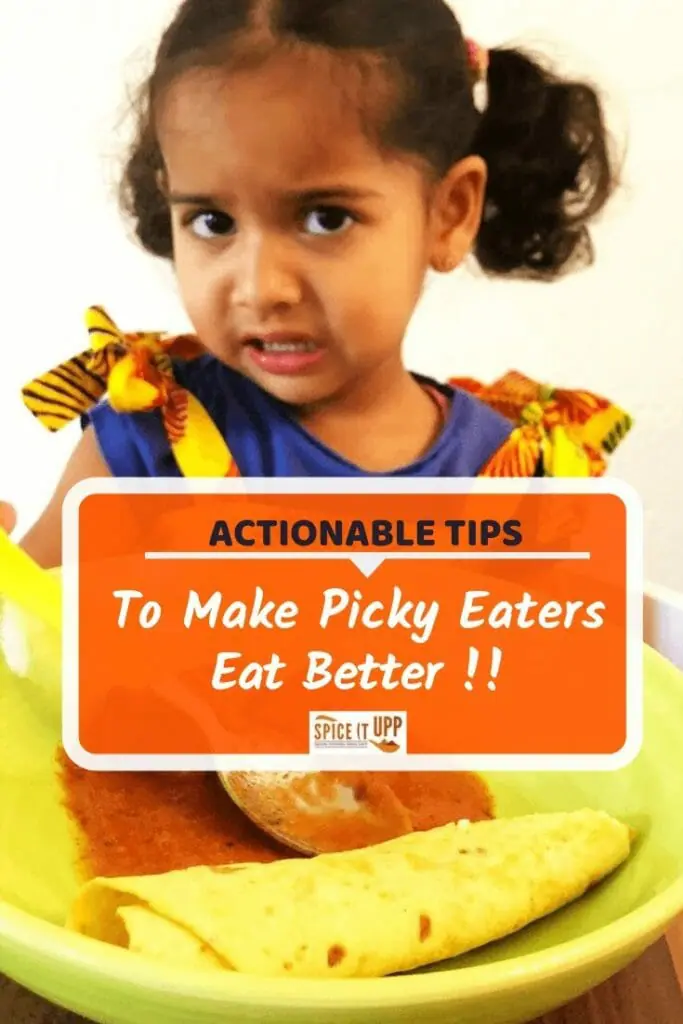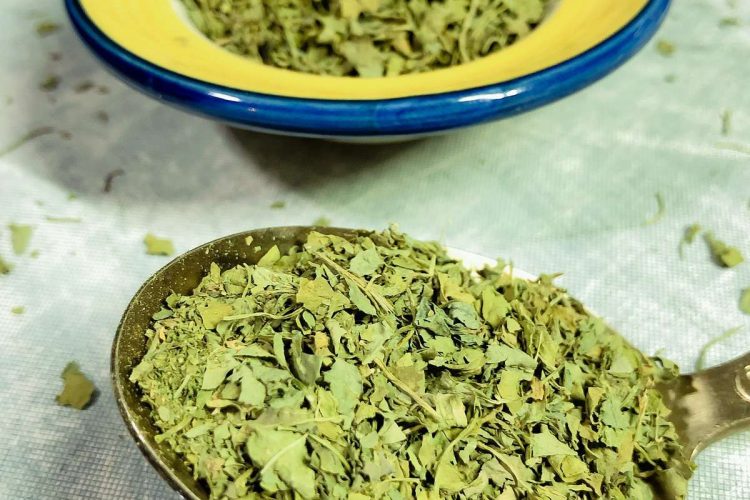Help your picky eater to eat better without putting a fight
Home » Indian Cooking Blog » Spices » Help your picky eater to eat better without putting a fight
- June 29, 2018
- 10 Comments
Are you worried about your picky eater toddler or even an adult?
Picking eating is more than just preference eating. It’s about someone’s sensory perception of taste. These tips on how to deal with picky eater will help picky eater kids to become a risk-taker.

Is your little bundle of joy, happy munching on crackers, sugar and toasts and refuses to try anything new?!!
That could be the first sign of a ‘ fussy or picky eater’.
Won’t you just love having everyone eat the same thing that you cook rather than cater for plain pasta for one, pasta with cheese for the other or pasta in tomato sauce without olives but extra cheese for the another and pasta with cheese and olive for the next and so on….. ppphhewww
I can just imagine your frustration and exhaustion of daily meal planning.
It’s after all your home and not an order at the coffee shop!
You see, like adults, children develop certain characteristics, whether it is about social interaction, behaviour or eating habits.
These habits evolve over time giving to what eventually becomes their personality.
When it comes to eating habits, there are many factors that influence their likes and dislikes of certain food and it is primarily to do with their taste receptors!
The good news is that there are easy tactics on how to get kids to eat better that too without putting up a fight!
What is a Picky Eater?
The Cambridge dictionary defines ‘Picky Eater’ as someone who is careful of choosing what they like to eat.
In other words, fussy eaters are very selective about what they eat and detest trying new tastes and flavours even if they may not have tasted it before.
Is Picking Eating Habit Healthy?
Have you ever wondered why Sue’s son eats just about everything and anything laid in front of him while you’ll be lucky if your picky eater kid manages to get down 4 spoons of plain boiled pasta?!!
This is because your little one has created himself/herself a comfort eating zone which he/she absolutely hates budging from.
There are primarily two characteristics of people or kids who are picky eaters:
- Unwillingness to try new food
- Consuming only limited or very similar kind of food.
Picky eating habits are the first signs of slowly edging towards what scientists call ‘food neophobia‘, which means the fear to try new food.
They tend to blatantly refuse to try any new food item which limits the variety of food they are willing to eat.
Kids who are picky eaters are essentially limited eaters.
There has been no conclusive study to prove that picky eaters are at any health risk.
You may have a valid concern about whether your child is getting the adequate supply of vitamins and minerals that a varied diet provides.
As long as your child is active and healthy you should not be overly worried about their picky eating habits.
However, a varied food intake does have its own benefits of maintaining a well balanced healthy diet, becoming adventurous eaters and at the same time relief you from the worry of ‘what to make for all!’

What Causes Picky Eaters To Become Fussy?
As I mentioned earlier, children like adults have certain individual characteristics.
Some characteristics they are born with and others develop due to situational influence.
This is the reason that children born to the same parents have different food and taste preference. And the reasons for this can be many.
In order to help your picky eating toddlers, older kids or even adults overcome their fear of new foods, it will help to better understand what factors influence their choosy eating habits.
Why is a child picky with food?
The answer to this question will help you deal with picky eater in a more thoughtful manner with a positive outcome.
1. Sensitive Taste, Colour and Texture Receptors
Children have very sensitive tastes which mature over time as they grow.
So if you think that your little one will enjoy the creamy luxurious bar of 80% cocoa bitter dark chocolate you bought since its chocolate, then I am afraid you may be disappointed.
Kids taste receptors take time to develop.
This happens with a limited but repeated taste experience.
This repeated exposure until adulthood makes us more tolerant of different tastes, textures and flavour.
The texture and colour of a particular food also send warning signals to the young developing minds which forces them to avoid foods that they may not like the texture of. Such as sliminess of okras, the soft texture of well-cooked capsicum or zucchini etc.
They also tend to avoid certain coloured food items such as pale green lettuce leaves, faded cooked beetroot, sloppy dark mushrooms etc.
Each child reacts differently to different tastes, colour and textures.
When trying to introduce new foods, it may be best to avoid introducing strong tastes such as bitter and sour which may send their taste buds to a shock.
2. Genetic factors
A study conducted by the University of North Carolina shows that 72% of children between the ages of 4 to 7, who refuse to try new food is due to their genes.
So if you dislike certain taste, food or texture there is a strong possibility that your child may also develop similar taste preference or taste limitation.
All though they may be born with sensitivity to particular tastes, it can change with time as their exposure to various tastes and flavour increase.
3. Situational Factor
Genes are not solely responsible for your kids eating habit.
What a child eats is also affected by their immediate surroundings.
Picky eating habits start as early as 2 or 3 that is at the toddler stage.
They begin to set a preference for few tastes and food and start to challenge your meal decisions.
The vegetables or fruits and meals they had excitedly gobbled up in few mouthfuls as babies is something they begin to avoid or even dislike.
It is at this stage that parental control over mealtimes influences the future eating behaviour of the toddler.
Toddlers love to mimic adults and therefore what you offer and eat together as a family will have a direct effect on toddler diet.
The other situational factor could be the presence of other distractions during meal times that is having the tele on, feeding child while playing, etc.
All these factors come in the way of the child’s natural curiosity to explore and absorb the immediate surrounding independently.
4. Preference for sugar and carbs
Ever wondered how your kids and even picky eaters get naturally attracted to sugar and carbs?
This is because their little bodies need a lot of energy to aid growth.
Carbs and sugar give them the instant boost of energy that sends them bouncing off!? (picture your post-birthday party sugar high kids)
Kids love this high and gradually gain a preference for the taste.
This is a reason that given a choice, children will naturally tend towards sweet and stratchy treats that make them feel good.
6. Parent-Child Power Struggle
Picky eating also stems from the different parental approach strategy taken to curb their picky eating behaviour.
Some parents take to bribing that is enticing them with a reward regardless of the outcome, others feel punishment may help instil fear and make them better eaters, while many simply let the picky eaters have their way and not worry about their eating habits.
There is a certain degree of a power struggle between the parent and child when it comes to preferred meals.
One may not like what has been offered while the other is determined to have their way.
A parents rectification strategy to the initial rejection of food has an effect on whether a child will become a future picky eater or not.

How To Get Kids To Eat Better
Science and studies have proved that picky eating is a habit, which means it is something that can be changed.
There are thousands of articles which recommend on how to deal with picky eaters with advice like, involve kids in cooking, offer a variety of food, present food that looks exciting, eat together etc.
Of course these tips are very valid and they work too.
But can you imagine cooking with your child or taking the time to make a smiley face or dinosaur food platter when you have only 30 minutes to serve something after a busy day of shopping, sorting, driving your kids around for their activities, cleaning and basically going around life?
All you want to do at this point is to make something that is convenient, quick, healthy and most importantly to THEIR liking!
I am going through the picky eating phase with my 2 and half year old ( She is 5 now). Trust me when I say, I can feel your pain.
My older was a breeze but this little terrifying angel of mine has a mind of her own!
My super sonic baby food vacuum has now turned into a food blasting pump!
I am hoping that it’s just a phase but I also know that this phase needs to be very delicately handled and harnessed to stop it from becoming a habit.
So, this is my game plan and tips to deal with fussy eaters. I am still in the beginning stages but have seen some positive results already.
UPDATE – Since I wrote this article 3 years ago, my little one has stopped fussing with food although she still has strong dislikes for certain foods)
1. Allow Your Child To Be Hungry
I am guilty of getting anxious if my girls have not eaten for a long time.
I am also heavily guilty of allowing them to snack as and when they like.
Trying to ensure that they are fed at all times actually backfired during meal times.
My little one was just not hungry enough to eat proper dinner regardless of whether it was something she liked.
The question of introducing a new food was of course not even worth wasting a peapod on.
So the first thing (that I found hardest to overcome myself) was to STOP her from snacking.
Out came the child safety cupboard and drawers locks and with a heavy heart, I locked them all away from easy access.
This, of course, did not mean that I starved them, definitely not. Just that I stopped giving them anything filling to eat at least 2 hours before serving dinner.
Fruits were ok but no crackers, cookies or cakes.
The good, well she was hungry to come, sit and eat during dinner.
Children are about 80% times more likely to eat better when hunger strikes.
A word of caution though. Overly hungry kids become very cranky, so do not push the pre-dinner fasting period too long that it hinders their temperament.
We all know by now that a cranky kid is very hard to reason with.
2. A Sweet and Starchy Start
Now that you have managed your child to get to the table, its time to start with your game plan.
I mentioned earlier most children naturally take to sugar and starchy foods.
So instead of introducing them to sloppy spinach the first time, try with sweet or starchy foods which they may not have tried before.
Some healthy foods to try are:
Sweet potato, yam, carrots, beetroot, broccoli, sweet peas, peppers, sweet corn, brown or wild rice, whole wheat, millet, quinoa, barley, polenta.
The natural sweetness of the vegetables and grains is a taste that they may not completely withdraw from.
Do not serve a full plate portion, start with small amounts for them to try.
They will be more likely to try new things when they feel hungry, see manageable portion sizes and are in a good mood.
Limit the variety of food you introduce and pace it out. Reintroduce each food in stages.
3. Pair up New with Old
It would be wishful thinking if you thought that making a full meal with one of the starchy sweet foods will work.
Remember you are at a very early stage of dealing with picky eaters. Do not sabotage the progress.
The trick here is to introduce something new along with a tried, tested and liked food. It could be noodles, pasta, rice, chicken nuggets or any food that they actually enjoy eating.
You can either add the vegetables to their preferred carb or include the grains to their favourite protein.
Here is a list of food ideas for picky eaters to try recipes.
Whatever combination works as long as its one new item that you manage to bring into the meal.
Also, remember to keep a backup.
Don’t mix the new ingredient with their preferred dish at once. Leave some aside that you can offer after they have tried a little or when you see there’s no point forcing.
You do not want your child to go hungry.
My other trick for pairing ingredients is to make the new ingredient the star of the show that is you can describe the meal as ‘crunchy crispy yummy bright broccoli trees with pasta!’ instead of ‘pasta and broccoli bake’.
Kids love a bit of drama and tales. Enjoy making up fantasy meals although it may be just fish fingers and chips you are serving.
4. Reward Positive Behaviour
So your child is now hungry, you have introduced something new for them to try along with their recognized meal.
What if they still say no!?
The likely hood of them scrutinizing, fragmenting your creation into tiny molecular particles so that they carefully pick out even the dust of ingredient they DO NOT like is way to high!
Do you take to bribery? Well No!
There is a difference between bribery and reward.
We parents are at some point guilty of bribing a child to stop or avoid bad behaviour. (remember the time you said, I’ll let you play on my phone if you do not run in the restaurant?).
A reward is something given after the display of good behaviour. You allow an extra 30 minutes of TV time because they tidied up after playing.
A way to encourage your child to try new food is to assure them that their action of eating something new makes them a ‘risk-taking superhero’.
Applaud positive behaviour by introducing a reward chart, treat them to a sweet, take them to the park anything which shows that there are enjoyable repercussions for trying new things!
Encourage them to try at least 2 – 3 mouthfuls of the new food and reward their success.
It’s a win-win situation.
5. Buddy Up
Have you noticed how kids like to mimic each other?
Seize this opportunity to reinforce good eating habits.
Invite a risk-taker friend over who you know enjoys eating and arrange a play cum meal time date!
Your picky pint is more likely to try and enter the popular squad than being left out!
Peers like to copy each other’s behaviour including eating habits which may just make the task a bit easy for you.

6. Avoid a food war
The worst time to introduce unfamiliar things is when tempers are high and the mood low!
If you or your child is in not the best of moods or too tired then avoid introducing something new that day.
It will put both of you off your meal and make it an unpleasant moment for all.
Eating and mealtimes should not be about the battle of power.
Force or punishment will make your child anxious and stubborn.
Kids feed off your anxiety levels.
If you feel tempers rising, take a step back and don’t make it into a big deal. You forcing them to eat will only make your child more adverse to trying new things.
It’s not a ‘New Food Trial Boot Camp’ so don’t make it one. Each day will be different. What worked yesterday may not work today.
So let it go…. just for the time being.

7. Do Not Give Up
By asking you to step down, I am in no way advocating the end of the trial to help with picky eaters.
All I am saying is that if your child refuses to eat a particular vegetable the first time, you should stop trying to feed it again immediately.
Instead, give it a break and try and introduce it again maybe in a new avatar.
You could change the accompanying preferred food or make a dish that they really enjoy eating added with the variant.
Picky eaters tend to avoid foods they are not familiar with.
It’s like you trying a new dish.
Think of it like you drinking lemon water to detox your body. You may not enjoy drinking it the first couple of times but with time you become familiar with the sourness of the water and drink it anyway.
Its the same with picky kids.
Keep offering the same food after intervals. They will become familiar with it and eventually to your utter astonishment even give it a try one day.
8. Respect Their Thoughts & Preference
More often than not we as parents have two ways to tackle challenging behaviour.
It’s either ‘my way or high way’ route or ‘have it your way’ route!
Both, in my opinion, are detrimental to the child’s understanding of right or wrong.
It’s important to note that each child is an individual and have their own likes and dislikes.
We need to recognise those instead of forcing our thoughts on them.
Your child may genuinely dislike a particular texture or taste.
If you happen to recognise the pattern after few failed attempts at offering that particular food, even after the stop and start method, then its perhaps a good idea to call quits with that food item!
As I mentioned, picky eating may not just be a habit thing.
It could stem from a genetic factor or oversensitive taste receptors that they were born with.
My older child, now 11, genuinely dislikes cheese in any form or kind. I have tried to hide it, melt it and even bribe (sorry, guilty) but none worked. She would gag at the mere sight or smell of it. She could even smell it out in a tomato sauce!
That’s when I gave up as I realised she really disliked cheese.
The funny part is that she is not a fussy eater at all. It is just one of those things her taste receptors negatively react to.
What I am trying to say is recognise the eating pattern and respect their decision when it comes to consistent denial.
You both will feel understood and will be glad it’s over without turning into a battle of wits!

Are You A Picky Eater?
Picky eating is more complex than just a bad habit.
There has been studies and research to support the reason why few people are averse to particular foods while others will devour anything.
Behavioural, genetic and situational factors all together contribute to picky eating habit.
So before you label someone as a picky eater and leave it at that, it helps to find the underlying cause of it and take appropriate steps to overcome the pickiness.
Things always do not turn out the way you want it to. But that surely does not mean that you do not try again.
Give yourself and your joy a little break before a breakthrough. It will eventually make some progress. If not the first or the second time but maybe the third or the forth!
The idea is to encourage positive and varied eating habit that makes your little darling a treat to treat!
Recommended Reading & Additional Resource To Handle Picky Eaters
The following books are great for additional and practical tips and programme to help you with picky eaters.




Fun Quirky Kids Mealtime Accessories
Make mealtimes exciting for kids with these fun kids dinnerware and utensils that encourage eating.
Construction Dinner Set with Placemat


Garden Fairy Combo with Utensil Set and Placemat

TriceraTACO Taco Holder

Car Heart Shape Egg Sushi Rice Mould

Multi Animal Training Chopsticks


Fun Cookie Cake and Sandwich Cutter Shapes
Over to You
Do you have any picky eaters in your family? Have you tried ways to encourage better eating? Would love to hear your tips and add them here.Thanks
Thankful for every click to share:
Related Posts
There are those odd occasions where you may have misjudged the heat of chilli ...
Fenugreek leaves is a herb that may not be readily available everywhere. Here ...
Hot spice to add heat to dishes. Large amounts also imparts a subtle red colour...
To rate click on stars
Related Posts
There are those odd occasions where you may have misjudged the heat of chilli ...
Fenugreek leaves is a herb that may not be readily available everywhere. Here ...
Hot spice to add heat to dishes. Large amounts also imparts a subtle red colour...





My boys are grown now but when they were young they hated anything green! I used to hide veggies inside other foods like put spinach in their bolognese! Also veggies were always on the table and eventually they started to eat them!
Hi Jacqueline! Yes, you sure knew what to do with your kiddies! Glad it all worked out for you.
Great tips! Passing on to my daughters for the grand babies!
Thanks Linda! Hope your daughter finds it useful!
This is such an informative post! Thanks for putting all the tips together.
Thanks for the encouraging words Tina!
What a great informative article! I myself was a picky eater as a child, but definitely grew out of it 🙂
Yes, Picky eating is a habit that you can overcome with time. Glad you did! Enjoy your adventurous eating.